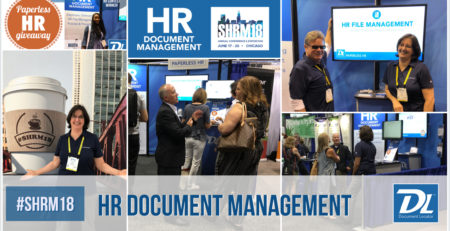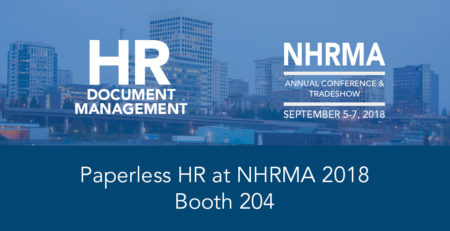Many companies’ HR personnel records are maintained today in ubiquitous 8-part employee file folders alphabetically within secured filing cabinets. The downsides of traditional HR filing cabinets include the inefficiency of manually maintaining the personnel folders, potential of records being lost or misfiled, consumption of valuable office space, and inability to mitigate disaster recovery risk in the event of fire, flood, or vandalism.
The disadvantages of paper HR records are clear, but lets explore the benefits of digitizing HR personnel records and maintaining them within a feature-rich cloud-hosted solution.
1. Access Personnel Records from Anywhere
Employees seek out organizations that value a beneficial work-life balance, which includes being supportive to employee’s family needs and work preferences, including the occasion to work from home. Having personnel records available securely over the internet, along with critical supporting HRIS\HRM systems, enables your human resources professionals full access to data from home, or when traveling, on 24/7 basis. This paperless approach allows your HR team to easily find documents and access systems to make informed decisions without delay. An example scenario is retrieving an employee’s emergency contact information following an incident, or handling an unexpected employee termination while away from the office.
2. Say Goodbye to Wet Signatures
A common reason that HR records are rendered into paper form is for signatory purposes. All too often an employee receives a file electronically (via e-mail or internet download) and then prints, signs, scans, and e-mails that document back to another individual who fundamentally repeats those exact steps. Eventually the record completes the approval cycle and is filed into an employee’s personnel folder. Aside from being horribly inefficient, the repeated scanning process degrades the document’s quality each time it’s scanned. We worked in HR departments where the Personnel Action Forms (PAFs) approval matrix requires documents signed, scanned, and e-mailed up to five times prior to being used for data entry into the HRIS system and ultimately filed as paper.
HR-centric solutions include electronic workflows routing PDF form templates or electronic forms that eliminate the need for printing entirely. They automatically calculate the appropriate approval chain based on form content like the employee’s reporting structure, form type, change percentage, or other key metrics the form supports. Eliminating the paper and manual processes can reduce the processing effort by as much as 80% over the traditional paper methods.
3. HR Technology without Burdening IT
Whether your IT resources are limited, overloaded, or simply uninformed of HR requirements, overcoming these hurdles by leveraging industry focused HR solutions will provide your team immediate access to systems tailored to your needs. In addition to requiring minimal infrastructure changes, cloud-based HR solutions can provide expert implementation advice from professionals who help clients transition to the new software and the solution provider will ensure your data is secured and backed up from a disaster recovery perspective. In our experience, most IT organizations are supporters of the cloud movement. By offloading lower value activities like server room maintenance and data backups, your IT resources have more time to deliver a greater level of internal support to employees.
4. Searching for Existing and Missing Files
Accessing a single employee’s HR folder and locating the appropriate record is almost muscle-memory for seasoned HR team members. However, introduce a curve-ball such as a request to retrieve all employee personnel reviews performed by a particular manager and you’ll see a look of consternation. That search requires several hours rifling through countless employee records. Once the information is found, you then also run the risk of misfiling the individual pages or entire folders as the data is returned to the filing cabinets.
With an HR personnel record system, employee files are tagged with key attributes indicating a document’s associated employee ID, employee status, document type, document date, next review date, and more. These index fields drive instantaneous search capabilities for simple searches such as a single employee’s insurance enrollment application, but also enable complex searches that go across all employee folders like Beneficiary Change Forms for employees in the state of Washington and California.
Even more powerful than searching on existing documents is the capability to search for missing documents. Cloud based HR personnel records system maintain the document metadata (type, date, and employee ID) related to each document placed in the system, which conversely means they can also generate reports on employees where certain documents are missing. Scenarios such as who has/has not signed the annual employee handbook or failed to complete their 401K enrollment form are traditionally tracked manually by spreadsheet can now be maintained by the system.
5. Automated Records Retention Compliance
Tired of participating in the annual terminated employee file purge and shred event? With personnel records categorized and maintained by a dedicated HR cloud solution, decisions on when to move an employee folder from the active hierarchy to the inactive folder structure, when to trigger a record retention policy, and how to adjust security when an employee leaves are done automatically by the system. Once your organizational rules are defined and applied, the system tracks and manages your entire personnel files archive to determine when a document becomes a record retirement candidate. In addition, the system electronically prompts the appropriate HR team member for destruction confirmation, or allows for protecting a group of files against destruction in the case of litigation.
Set Your Paperless HR Goals
Surveys indicate more than 50% of HR departments today rely, in part or exclusively, on paper records for their business. Intuitively we know this is not efficient, nor a safe means of maintaining employee personnel and medical records. The five points provided here offer some insight into the opportunities available through a cloud hosted HR document records system. Whether you are interested in reducing paper usage, reclaiming office space, providing for disaster recovery, allowing employees to telecommute, implementing records management, or simply operating more efficiently, systems exist today to help you achieve your goals.
Register for our Next Upcoming HR Webinar.







